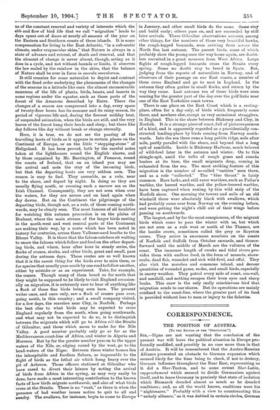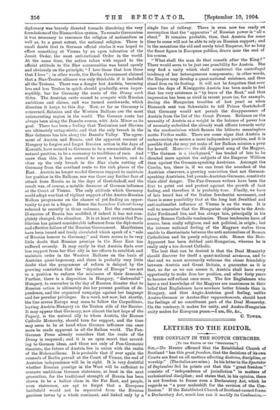CORRESPONDENCE.
THE POSITION OF AUSTRIA.
[To TUE EDITOR OF TRY "SrEcrAios."]
SIR,—Signs are not wanting that the conclusion of the present war will leave the political situation in Europe pro- foundly modified, and possibly in no case more than in that of Austria. It will be remembered that the Austro-Russian Alliance presented an obstacle to German expansion which seemed likely for the time being to check, if not to destroy, German influence throughout the Near East, representing as it did a Slav-Teuton, and to some extent Slav-Latin, rapprochement which seemed to divide Germanism against itself, and to leave Germany in precisely that state of isolation which Bismarck dreaded almost as much as he dreaded coalitions ; and, as all the world knows, coalitions were his "nightmares." Probably with a view to counteracting this ." unholy alliance," as it was dubbed in certain circles, German diplomacy was bravely directed towards dissolving the very foundations of the Bismarckian system. To reunite Germanism it was necessary to renounce the religion of nationalism as well as, to a great extent, the national religion. There is small doubt that in German official circles it was hoped to effect something at Vienna by an open toleration of the Jesuit Order, the most anti-national Order in the world. At the same time, the action taken with regard to the official attitude to the Slav communities was based openly and obviously on the principle, "I love those that love those that I love" ; in other words, the Berlin Government claimed that a Slav-Teuton alliance was only thinkable if it included all the Teutons. There was a danger lest Austria, becoming less and less Teuton in spirit, should gradually, even imper- ceptibly, bar for Germany the route of the Drang nach Osten. The Austrian route ceased to compete with Russian ambitions and claims, and was turned southwards, which direction it keeps to this day. Now, so far as Germany is concerned, Salonica and the Western Balkans are the most uninteresting region in the world. The German route has always been along the Danube course, with Asia Minor as its goal. There has been a feeling that Teutonism and Slavism are ultimately antagonistic, and that the only breach in the Slav defences has lain along the Danube Valley. The agree- ment of Austria and Russia, and the apparent consent of Hungary to forgive and forget Russian action in the days of Kossuth, have seemed to Germans to be a renunciation of the natural position, to be a recreancy to traditions of race. And more than this, it has seemed to erect a barrier, and to close up the only breach in the Slav chain cutting off Germany from the overland route to the rich places of the East. Austria no longer needed German support to maintain her position in the Balkans, nor was there any further fear of attack from Russia as in the days of G-ortchakoff, and the result was, of course, a notable decrease of German influence at the Court of Vienna. The only attitude which Germany could adopt was that of vigilant support of the Austro-Russian Balkan programme on the chance of yet finding an oppor- tunity to put in a finger. Hence the besondere Unterstatzung referred to recently in th3se columns. But the continuous ill-success of Russia has modified, if indeed it has not com- pletely changed, the situation. It is at least certain that Pan- Slavism has gained considerable influence from the diplomatic and effective failure of the Russian Government. Manifestoes have been issued and freely circulated which speak of a "sale of Russian honour to Germany," and there seems to be very little doubt that Russian prestige in the Near East has suffered severely. It may easily be that Austria finds ever less support from her Slav ally in her efforts to establish and maintain order in the Western Balkans on the basis of Austrian quasi-hegemony, and there is probably very little doubt that the programme of reform is delayed by the growing conviction that the "deputies of Europe" are not in a position to enforce the minimum of their demands. Further, there is a disposition in Hungary, " distressful " Hungary, to remember in the day of Russian disaster that to Russian action is ultimately due her present position of de- pendence, and the organised campaign against her language and her peculiar privileges. In a word, not now, but shortly, the line across Europe may seem to follow the Carpathians, leaving Austria-Hungary on the Teuton side of the Barrier. It may appear that Germany, now almost the last hope of the Papacy, is the natural ally to whom Austria, the Roman Catholic Monarchy, should turn for support, and the time may seem to be at hand when German influence can once more be made apparent in all the Balkan world. The Pan- German Press already considers that the route of the Drang is reopened ; and it is an open secret that accord- ing to German ideas, and those not only of Pan-Germanic theorists, the future of Austria lies in union with the realm of the Hohenzollerns. It is probable that if ever again the counsels of Berlin prevail at the Court of Vienna, the end of Austrian independence will be in sight. It is very doubtful whether Russian prestige in the West will be sufficient to overawe ambitious German statesmen, at least in the next generation, for the traditional strength of Russia has been shown to be a hollow sham in the Far East, and people, even statesmen, are apt to forget that a European battlefield would not be separated from the Russian garrison towns by a whole continent, and linked only by a single line of railway. There is even now too ready an assumption that the "apparatus" of Russian power is "all a cheat." It remains probable, then, that Austria for some time to come will not be able to rely on Russian support; and in the meantime the old and sorely tried Emperor, for so long the finest figure in European politics, draws near the end of his course.
"What shall the man do that cometh after the King ? " There would seem to be just one possibility for Austria. She may find a unity which shall counteract the centrifugal tendency of her heterogeneous components; in other words, the Empire may develop a quasi-national existence, and thus stand firm on its footing. It will not be forgotten that ever since the days of lainiggriitz Austria lia,s been made to feel that her very existence is " by leave of the Rest," and that impression has been as vivid in recent years (as, for example, during the Hungarian troubles of last year) as when Bismarck sent von Schweinitz to tell Prince Gortchakoff that Germany would not permit the disappearance of Austria from the list of the Great Powers. Reliance on the necessity of Austria as a weight in the balance of power has of necessity enfeebled the already weak efforts towards unity in the condominium which flaunts the hitherto meaningless motto Viribus unitis. There are some signs that Austria is endeavouring to secure a more independent position, and it is possible that she may yet make of her Balkan mission a prop for herself. Moreovc... the old doggerel song of the Magyar, "The German is a blackguard," has tended of late to be directed more against the subjects of the Emperor William than against the German-speaking Austrians. Amongst the Czechs, too, there is, if we can trust the soundest of the Austrian observers, a growing conviction that not German- speaking Austrians, but pseudo-Austrian-Germans, constitute their chief danger. The Pan-German writers have been the first to point out and protest against the growth of that feeling, and therefore it is probably true. Finally, we have of late heard less of the Italian Irredentist movement, and there is some possibility that at the long last Jesuitical and anti-nationalist influence at Vienna is on the wane. It is well to remember that the Hungarian objection to the Arch- duke Ferdinand lies, and has always lain, principally in his strong Roman Catholic tendencies. Those tendencies have, of course, been really religious, and not political, in origin ; but the intense national feeling of the Magyars makes them unable to discriminate between the anti-nationalism of Roman Catholicism and its purely religious side. Hence the Heir- Apparent has been dubbed anti-Hungarian, whereas he is really only a too devout Catholic.
The best that can be desired is that the Dual Monarchy should discover for itself a quasi-national stio-rcipzera, and to that end we must necessarily welcome the closer friendship between Austria and Great Britain, a guarantee as it is that, so far as we can assure it, Austria shall have every opportunity to make firm her position, and after forty years to become self-reliant once more., The few Englishmen who have a real knowledge of the Magyars are unanimous in their belief that Englishmen have nowhere better friends than in Hungary, and thus Anglo-Austrian good feeling, unlike Austro-German or Austro-Slav rapprochements, should hurt the feelings of no constituent part of the Dual Monarchy. On the contrary, it makes for unity, and Austro-Hungarian unity makes for European peace.—I am, Sir, &c.,
C. TOWER.



































 Previous page
Previous page